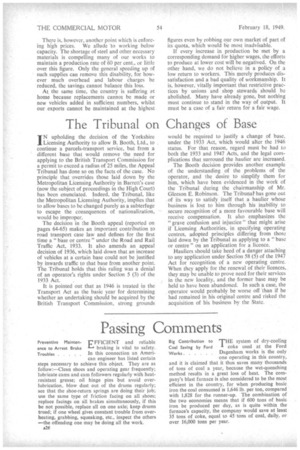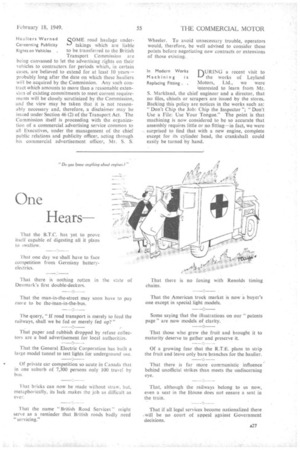Passing Comments
Page 2

Page 3

If you've noticed an error in this article please click here to report it so we can fix it.
Preventive MaintenFFIC1ENT and reliable ance to Arrest Brake " braking is vital to safety.
Troubles In this connection an Ameri can engineer has listed certain steps necessary to achieve this object. They are as follow:—Clean shoes and operating gear frequently; lubricate cams and cam followers regularly with heatresistant grease; oil hinge pins but avoid overlubrication, blow dust out of the drums regularly; see that the shoe-return springs are doing their job; use the same type of friction facing on all shoes; replace facings on all brakes simultaneously, if this be not possible, replace all on one axle"; keep drums trued; if one wheel gives constant trouble from overheating, grabbing, squeaking, etc., inspect the others —the offending one may be doing all the work.
A26
Big Contribution to THE system of dry-cooling Coal Saving by Ford 1 coke used at the Ford Works Dagenham works is the only one operating in this country, and it is claimed that it thus saves many thousands of tons of coal a year, because the wet-quenching method results in a great loss of heat. The company's blast furnace is also considered to be the most efficient in the country, for when producing basic iron the coal consumed is 1,646 lb. per ton, compared with 1,828 for the runner-up. The combination of the two economies means that if 600 tons of basic iron be produced per day, as is quite within the furnace's capacity, the company would save at least 35 tons of coke, equal to 45 tons of coal, daily, or. over 16,000 tons per year. SOME road haulage undertakings which are liable to be transferred to the British Transport Commission are being canvassed to let the advertising rights on their vehicles to contractors for periods which, in certain cases, are -believed to extend for at least 10 years— probably long after the date on which these hauliers will be acquired by the Commission. Any such contract which amounts to more than a reasonable extension of existing commitments to meet current requirements will be closely scrutinized by the Commission, and the view may be taken that it is not reasonably necessary and, therefore, a disclaimer may be issued under Section 46 (2) of the Transport Act. The Commission itself is proceeding with the organization of a commercial advertising service common to all Executives, under the management of the chief public relations and publicity officer, acting through his commercial advertisement officer, Mr. S. S.
Hauliers Warned Concerning Publicity Rights on Vehicles .
Wheeler. To avoid unnecessary trouble, operators would, therefore, be well advised to consider these points before negotiating new contracts or extensions of those existing.
In Modern Works r)URING a recent visit to Machining is .1.-" the works of Leyland Replacing Fitting . Motors, Ltd., we were interested to learn from Mr. S. Mar kland, the chief engineer and a director, that no files, chisels or scrapers are issued by the stores. Backing this policy are notices in the works such as: "Don't Chip the Job: Chip the Inspector "; "Don't Use a File: Use Your Tongue." The point is that machining is now considered to be so accurate that assembly requires little or no fitting—in fact, we were surprised to find that with a new engine, complete except for its cylinder head, the crankshaft could easily be turned by hand.


























